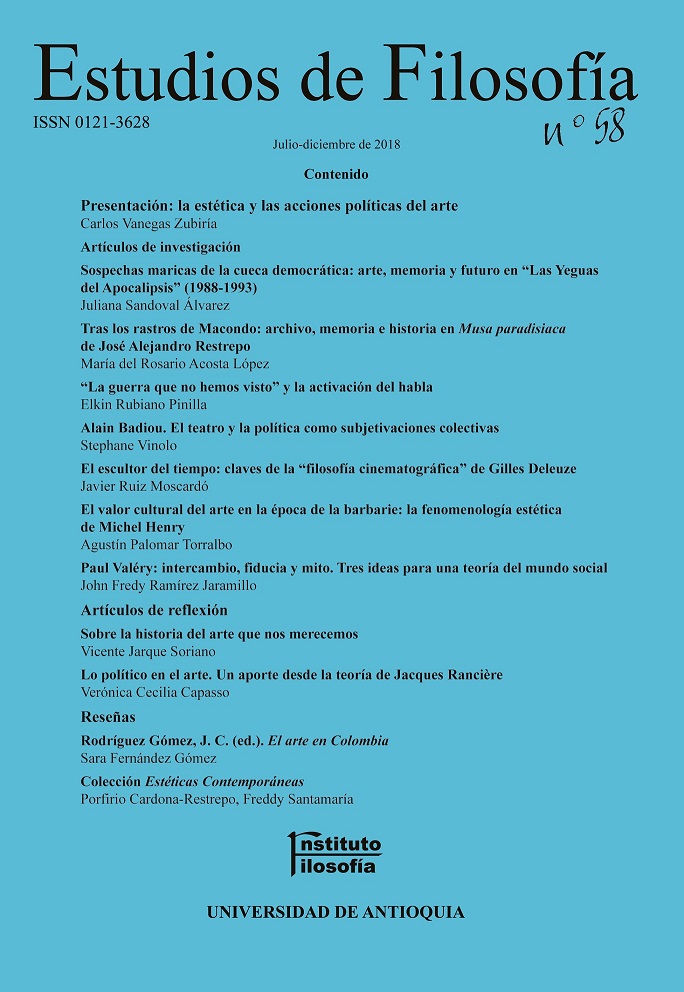Colección Estéticas Contemporáneas Universidad Pontificia Bolivariana
DOI:
https://doi.org/10.17533/udea.ef.332753Keywords:
Esthetic, neopragmatic, Language, PoliticsAbstract
The birth of the collection "Contemporary Aesthetics" is based on the following question: When thinking today about the role of aesthetics, do we, in turn, rethink the function of philosophy? Can you talk about a pragmatist aesthetic? What do artistic expressions communicate, and how do they impact other social practices? These questions raise research regarding some of the new challenges of aesthetics, challenges that have been rigorously addressed by the American philosopher Richard Shusterman (2000). Shusterman and Danto understand that language is eminently communication and that with this same performative language, you can do things with words (following Austin and Searle). Shusterman (2000) proposes that aesthetic considerations are crucial in determining how we choose to lead our lives and what we consider a good life to be. Considerations that recall Wittgenstein's dictum according to which ethics and aesthetics are one (Shusterman, 2000, p. 237). From these ideas, the function of philosophy, in relation to the artistic experience, becomes vitally important since by rethinking art from a pragmatist aesthetic, the very function of philosophy is rethought.
Downloads
References
Benjamin, W. (2003). La obra de arte en la época de su reproductibilidad técnica. Traducción de Andres E. Weikert. Mexico D.F.: Itaca.
Cardona–Restrepo, P. (2008). Más allá de la estética analítica en el neopragmatismo de Richard Shusterman. Escritos. 16(36), 81–115.
Cardona–Restrepo, P. (2009). Pluralismo artístico. Medellín: Universidad Pontificia Bolivariana. (Colección Estéticas contemporáneas 1).
Cardona–Restrepo, P. & Solórzano, A. (2011). Recepción y apreciación del arte y la estética. Medellín: Universidad Pontificia Bolivariana. (Colección Estéticas contemporáneas 2).
Cardona–Restrepo, P. & Solórzano, A. (2012). Arte y emancipación estética. Medellín: Universidad Pontificia Bolivariana. (Colección Estéticas contemporáneas 3).
Cardona–Restrepo, P. & Solórzano, A. (2013). Los dominios de la estética. Medellín: Universidad Pontificia Bolivariana. (Colección Estéticas contemporáneas 4).
Cardona–Restrepo, P. & Solórzano, A. (2014). El escenario doméstico. Medellín: Universidad Pontificia Bolivariana. (Colección Estéticas contemporáneas 5).
Cardona–Restrepo, P. & Santamaría, F. (2014). Estética analítica: entre el pragmatismo y el neopragmatismo. Medellín: Universidad Pontificia Bolivariana. (Colección Estéticas contemporáneas 6).
Cardona–Restrepo, P.; Santamaría, F. & Molina, C. (2015). Cuerpo y acción. Medellín: Universidad Pontificia Bolivariana. (Colección Estéticas contemporáneas 7).
Cardona–Restrepo, P.; Santamaría, F. & Molina, C. (2015). Cuerpo y prácticas estéticas. Medellín: Universidad Pontificia Bolivariana. (Colección Estéticas contemporáneas 8).
Cardona–Restrepo, P.; Santamaría, F. & Osorio, J. (2017). Cine y pensamiento. Medellín: Universidad Pontificia Bolivariana. (Colección Estéticas contemporáneas 9).
Cardona–Restrepo, P.; Santamaría, F. & Osorio, J. (2017). Formas del cine. Medellín: Universidad Pontificia Bolivariana (Colección Estéticas contemporáneas 10).
Cardona–Restrepo, P. & Correa, L. (2018). Literatura y política. Medellín: Universidad Pontificia Bolivariana. (Colección Estéticas contemporáneas 11).
Shusterman, R. (2000). Pragmatic Aesthetics. Living Beauty, Rethinking Art. Second Edition. Oxford: Rowman & Littlefield Publishers.
Published
How to Cite
Issue
Section
Categories
License
Copyright (c) 2018 Porfirio Cardona-Restrepo, Freddy Santamaría Velasco

This work is licensed under a Creative Commons Attribution-NonCommercial-ShareAlike 4.0 International License.
Authors who publish with this journal agree to the following terms:
1. The Author retains copyright in the Work, where the term "Work" shall include all digital objects that may result in subsequent electronic publication or distribution.
2. Upon acceptance of the Work, the author shall grant to the Publisher the right of first publication of the Work.
3. The Author shall grant to the Publisher a nonexclusive perpetual right and license to publish, archive, and make accessible the Work in whole or in part in all forms of media now or hereafter known under a Creative Commons Attribution-NoCommercia-ShareAlike (CC BY-NC-SA 4.0), or its equivalent, which, for the avoidance of doubt, allows others to copy, distribute, and transmit the Work under the following conditions: (a) Attribution: Other users must attribute the Work in the manner specified by the author as indicated on the journal Web site;(b) Noncommercial: Other users (including Publisher) may not use this Work for commercial purposes;
4. The Author is able to enter into separate, additional contractual arrangements for the nonexclusive distribution of the journal's published version of the Work (e.g., post it to an institutional repository or publish it in a book), as long as there is provided in the document an acknowledgement of its initial publication in this journal;
5. Authors are permitted, and Estudios de Filosofía promotes, to post online the preprint manuscript of the Work in institutional repositories or on their Websites prior to and during the submission process, as it can lead to productive exchanges, as well as earlier and greater citation of published work (see The Effect of Open Access). Any such posting made before acceptance and publication of the Work is expected be updated upon publication to include a reference to the Estudios de Filosofía's assigned URL to the Article and its final published version in Estudios de Filosofía.















